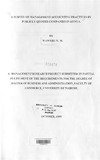| dc.description.abstract | The study reported here examined the management accounting practices, and
management accounting techniques used by publicly quoted companies in Kenya and the
type of management accounting reports produced and the frequency of their production.
The study also explored the management accounting techniques used by these companies
and the extent of their utilization. The basic premises of the study was that the success of
any business in a competitive environment depend to a large extent, on the availability of
timely and quality information for decision making.
The study was a census study of all the publicly quoted companies in Kenya. Data was
collected using a semi-structured questionnaire and analysed using tables, proportions,
averages and percentages. The chi-square and normal distribution tests were used to
conduct pertinent statistical tests.
The findings from these analysis led to the following conclusions:
(a) The most extensively used management accounting practice is budgeting. This
was rated as the most important management accounting practice. The findings
however revealed that there was no significant relationship between type and
process of budgeting and the ownership and sector of the company.
(b) The most important purpose of management accounting reports were planning
and control. Most of the management accounting reports are produced monthly.
(c) There does not exist a significant gap between management accounting theory
and management accounting practice. However, there is limited application of
quantitative management accounting techniques in Kenya.
(d) There is preference of simple management accounting techniques to the complex
techniques. This is probably due to the cost involved and the complexity of these
elaborate techniques which may outweigh their benefits.
On the basis of these findings, the following managerial recommendations appear
appropriate:
(a) Companies in Kenya should. move towards strategic management accounting. In
this regard, management accounting information require to be sourced from both
within and outside the organisation.
(b) All staff in the organisation should be involved in management accounting.
(c) Less preference should be given to variance analysis (investigation). In this
respect a feed forward control approach is suggested.
(d) Since management accounting has been seen to be deeply rooted in this country,
there is need for a regulatory framework. In this regard the establishment of an
Institute of Certified Management Accountants of Kenya body is suggested. | en |

